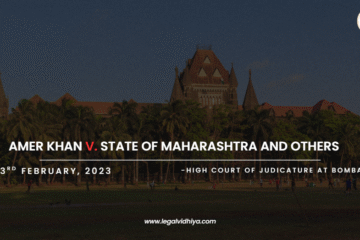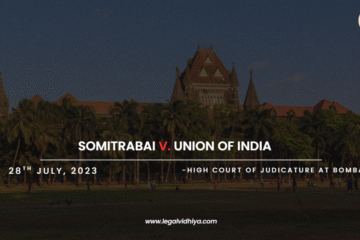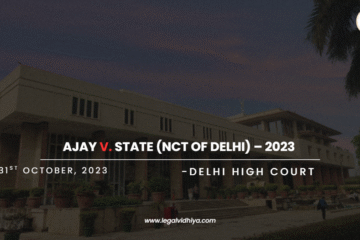| Case name | Gwalior Development & other v. Bhanu Pratap Singh |
| Citation | (2023) 04 SC CK 0055 |
| Date of Judgment | 19-04-2023 |
| Appellant-Respondent | Gwalior Development Authority-Bhanu Pratap Singh |
| Bench | Hon’ble Justice Ajay Rastogi, Hon’ble Justice Bela M. Trivedi |
| Civil Appeal No. | 8549 of 2014 |
| Statutes referred | 1.Constitution of India,1950 Article 12 : definition of state with respect to share of capital Article 14 : Equality before law Article 226 : Power of High court to issue and order various writs 2.Registration Act,1908 Article 17 : Compulsory Registration of deeds pertaining to immovable property |
| Decision | Allowed |
ABSTRACT
The case of Gwalior Development Authority vs Bhanu Pratap Singh on 19 April, 2023, is a dispute over the grant of leases of different plots under the transport city scheme. The petitioner had granted a lease of 18,262.89 sq. meters to the respondent, but the respondent claimed that he was entitled to a lease of an additional 9,625.50 sq. meters of land, which the petitioner had failed to grant. The High Court of Madhya Pradesh directed the petitioner to execute the lease deed in favor of the respondent for the remaining area, but the Supreme Court of India held that the High Court had no jurisdiction to issue such a mandamus. The court directed the respondents to execute the lease deed in favor of the petitioner and pay interest accordingly. The judgment provides a detailed analysis of the facts of the case, legal arguments, and precedents, and provides a comprehensive overview of the court’s decision.
FACTS
An advertisement had been issued by the appellants for grant of leases of various plots, in accordance of Transport city scheme and invitations for bids had been released for the same. The respondent, one of the bidders for a specific market complex made an offer regarding the plot at Rs. 725/- per sq. meters. The offer, of the respondent being the highest bid had been accepted by the appellants and an allotment letter was issued in favor of the respondent. The plot had been decided to be leased out in the favor of the respondent for a consideration amount of Rs.2,06.67,966/- and the respondent was instructed to deposit an earnest amount of 15 lakhs along with the amount upto 31st October,1999.The allotment letter contained a condition which prescribed that the market complex could only be constructed in compliance to plan given by the development authority and the time frame for the completion of the same would be two months. The conditions also stipulated the forfeiture of security amount upon default or delay in payment in installments.
Upon request of the respondent, the development authority revised the layout. The respondent defaulted in payment of installment amounts but no action had been taken by the authority in such regard either through forfeiture of security amount or cancellation of the bid.However it is speculated that following certain negotiations, the principal amount was adjusted with the bid amount of the auction. A lease deed was executed in 2006 however the area in the same was less than that of the original lease agreement. The respondent moved to file a mandamus against the appellants taking plea of article 226 of the constitution, to execute the lease deed for the remaining area which was executed in the first deed but not in the second deed. The petition was accepted by the division bench of the high court and they directed the appellants to carry out the deed with inclusion of the remaining area and further stated that no additional consideration was to be paid by the respondent except the due interest for the interregnum period.
CONTENTIONS
APPELANTS
By senior advocate, Sanjay Hegde: The counsel stated that because of the defaults on the part of the respondent (in the present case) the auction was capable of being cancelled however indulgence was granted by the authorities after negotiations. The last installment was paid by the respondent in 2005 which comprised of the principal amount summed up with the interest amount and the parties being signatories, the deed thus executed was drawn on mutual consent. The counsel insisted stress on the flawed inference of the high court because the deed was executed with the consent of the parties leaving no space for demurs. And the decision of the court directing the execution of the deed for the remaining area implied an amendment to the Instrument , an act which is beyond the scope of powers of court under article 226.
RESPONDENTS
The counsel for the respondents, insisted on the fact that no viable reason backed the severability of the area of land as advertised through the auction. The counsel further asserted that the state ought to ensure legitimacy in business/commercial transactions and equitable balance had already been done by directing the respondent to pay the interest amount for the interregnum period.
JUDGMENT ANALYSIS
The court held that that the granting of undue indulgence to the respondent by the appellants while non-conformity with the terms of the agreement pertaining to cancellation of bid and forfeiture of earnest money directed towards misuse of the discretionary powers which stands in violation of Article 14. Further the court was also of the view that this undue indulgence also pointed towards undue preference which finds no place in commercial transactions and that principles of equity do not apply to commercial transactions.
The court also asserted that the lease deed had been ought to be registered as per section 17 of the Registration act following which no amendments would be permissible. The court pronounced it’s verdict which held that the respondent could either purchase the disputed remaining area.However if the respondent failed to show willingness to proceed with the same the appellants could further initiate the disposal of the land.
While the present case pertains to the issue of deed between the respondent and the appellant , the judgment serves to redefine and circumscribe the powers of the High Court vested through Article 226. The judgment also seeks to assert a principle that one a deed is executed by means of mutual consent of the parties in the deed, further complaints and challenge the terms of the agreement so executed.
This analysis has been written by Insha Pani, a student of National Law University Odisha and an inter under The Legal Vidhiya.
BIBLIOGRAPHY
- Advocatekhoj- https://www.courtkutchehry.com/Judgement/Search/t/2368936-gwalior-development-authority-and-another
- Free law- https://www.freelaw.in/legalnews/Under-Article-226-the-High-Court-cannot-alter-or-amend-the-lease-deed-Supreme-Court
- The Indian Lawyer- https://theindianlawyer.in/supreme-court-holds-that-parties-are-not-entitled-to-challenge-a-registered-instrument-executed-with-mutual-consent-of-parties-in-a-writ-petition/
- India Kanoon- https://indiankanoon.org/doc/192794094/
This article is written by Insha Pani of NLUO, an intern under Legal Vidhiya




0 Comments